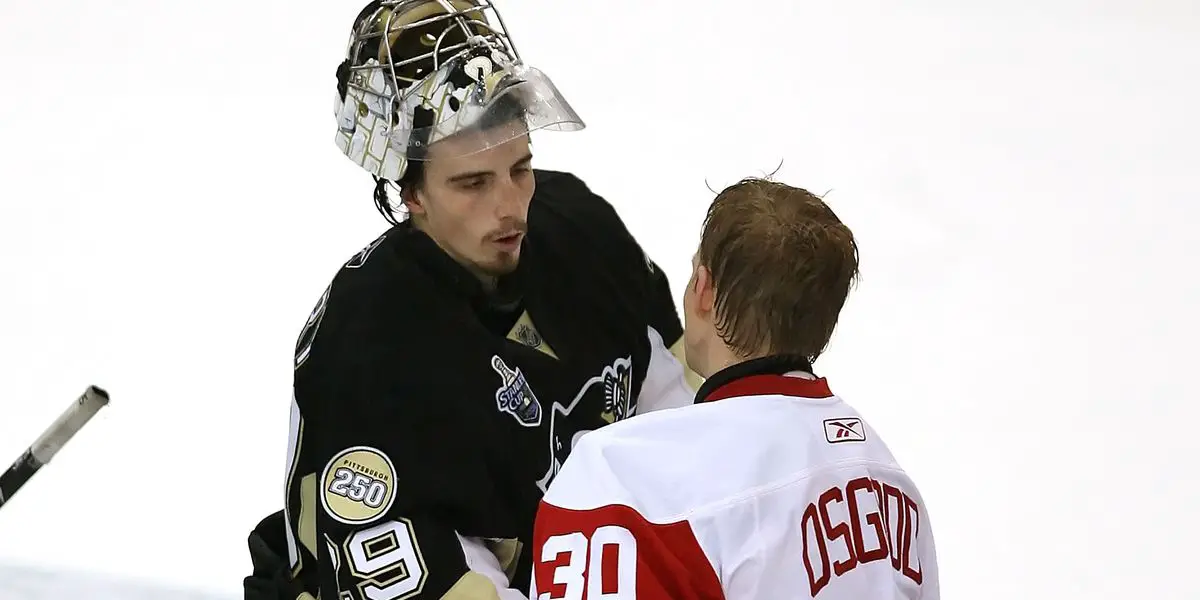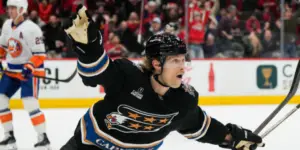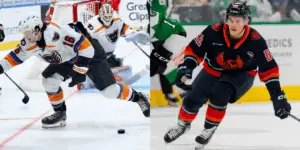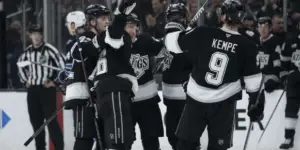
When one thinks of Hall of Fame caliber players in any professional sport, one usually thinks of an athlete with outstanding numbers, a plethora of personal awards, and who played a big part in helping their team win a championship.
The Hockey Hall of Fame seems to be a different kind of animal. There have always been many debates about which players/personalities should be in, who should not be in, and what exactly the criteria should be for inducting someone into hockey’s hallowed hall should be.
This is especially true when it comes to the masked men of hockey. In hockey, the goaltender is an important position as it used to be that teams won and lost games and championships with their guy between the pipes.
That outlook has changed over the last three decades or so. There have been more defensive schemes, and shot blocking has become more and more prevalent in the league.
One goaltender that has been a victim of this is Chris Osgood. Many, especially Detroit Red Wings fans, believe that Osgood should already be in, but that is not the case.
There is no doubt that Osgood has an impressive resume. He won three Stanley Cups (two as the starting goaltender of the Red Wings in 1998 and 2008), racked up 401 career regular-season wins, sealed 74 postseason victories, and had a respectable 2.49 career goals-against average, and notched 50 career shutouts.
On paper, Osgood’s numbers indicate that he really should be in. However, many argue that Osgood’s success was the product of the great play of his team in front of him, as the Wings played sound defense and had a high-octane offense.
Speaking of having over 400 career wins, former St. Louis Blues, Edmonton Oilers, Toronto Maple Leafs, Detroit Red Wings, Calgary Flames, and Arizona Coyotes netminder Curtis Joseph has 454 of them. More than likely, what the selection committee has looked at is the fact that Joseph never won a Cup and has 352 career losses.
Another goaltender that should be in but is not is Mike Vernon. This is a two-time Stanley Cup champion, a 385-game winner, and a five-time All-Star.
Vernon starred between the pipes for the likes of the Calgary Flames, Detroit Red Wings, San Jose Sharks, and Florida Panthers. While he did win a Cup with the Red Wings in 1997, he played his best when he was in Calgary.
He won a Cup with the Flames in 1989, took them to the Final in 1986, and played at a time when the league’s offense was unbelievable, with the likes of Wayne Gretzky, Mario Lemieux, and Brett Hull running the show. While these guys were able to put the puck behind him many times, he came up big when it mattered most.
One could also make a case for Tom Barrasso. He may have played with an unbelievably offensive hockey club in the Pittsburgh Penguins back in the 90s, but he still helped them to back-to-back Cups in 1991 and 1992.
It can be said that if not for Mario Lemieux’s dominant performances in those postseasons, Barrasso would have captured at least one Conn Smythe Trophy as the league’s most valuable player in the playoffs. In 91, he won 12 games and had a 2.60 GAA and a .919 save percentage; in 92, he won 16 games and finished with a 2.82 save percentage, and a .907 save percentage. For a team that was focused on offense, these numbers that Barrasso posted are impressive.
This is a goaltender that accomplished a lot in his two decades in the NHL. He finished with 369 career wins, won two Cups (1991 and 1992), won both a Calder Memorial Trophy as the league’s top rookie (1984) and a Vezina Trophy as the league’s top goaltender (1984), has 61 career playoff wins, and was named to either the first or second NHL All-Star team three times (1984, 1985, and 1993).
The selection committee might be reading too much into his career 2.98 goals-against average, and .889 save percentage. What they have to realize is that the era he played in was extremely tough on goaltenders and that, despite that, he rose to the occasion and won a lot of hockey games.
Selecting goaltenders to be inducted into the HHOF is not as easy as one might think. It’s not just about the numbers anymore.

Stanley Cup Aspirations – Cue’ the Duck Boats Pod
Discover more from Inside The Rink
Subscribe to get the latest posts sent to your email.



